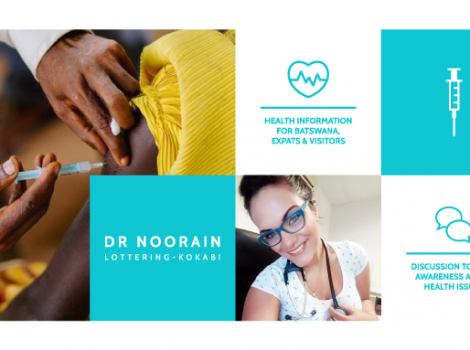
We have all been there – one second you are relaxing; or in the middle of the sweetest dream; or even mid-meeting when you start to feel your stomach gurgle, hear it rumble and suddenly have to make a Usain Bolt type sprint to the bathroom. Oh yes! The “running tummy”, “tummy bug”, “the runs” – although this infamous bad boy has many names, its official name is gastroenteritis.
Here in Botswana, it is pretty common so let us look at the basics so that you know exactly how to handle it if you find yourself in the nasty position of experiencing it.
Medically speaking, gastroenteritis refers to the inflammation of the bowels that leads to vomiting and/or diarrhoea. Other associated symptoms are fever, headache, lethargy or dehydration – the most dangerous. Gastroenteritis is most commonly caused by teeny tiny microorganisms called viruses; in kids the rotavirus and in adults predominantly the norovirus.
However, there are some bacterial causes too. Think of a few hours after having a delicious meal and you have to make that toilet sprint. Food poisoning from improperly prepared food or food that isn’t stored at the right temperature is another very common cause of the runs.
What to do when you have the runs
The good news is that it usually resolves itself in a few days. However, if you pick up the tummy bug, it is imperative to exercise the following:
- It is always best to stay home for at least 48 hours, washing your hands regularly as the cause may be viral and hence easily spread.
- Fluids, fluids, fluids! Remember; you are losing fluids, so you need to refill to keep strong and to avoid dehydration. Anything you put out, you need to replace and good old water is best.
- Avoid fruit juices and cold drinks as much as possible, as these can sometimes aggravate diarrhoea especially in kids. Rehydration salt sachets are also very beneficial as they replace precious and much-needed electrolytes that are lost, especially during vomiting
- Do try eating foods such as thick soup, bread, mash potato or pap, ideally in small amounts. Food is essential because it gives you energy and strength.
- Panado/Grandpa/Compral can be taken for any fever, headache and/or body pains.
- Please do not take any anti-vomiting/anti-diarrhoea medication without consulting a medical practitioner. While your pharmacist may be able to advise you on these, it is always best to have a doctor’s check-up, especially with the kiddies.
While gastroenteritis is a fairly straightforward illness and more often than not just “runs” its course, there are some red flag signs to be wary of and these warrant an immediate doctor’s consultation:
- Diarrhoea with blood
- Persistent vomiting with the inability to keep down any fluids
- High fevers of >38 C or persistently high fevers
- Failure of symptoms to resolve within a few days.
- Dehydration symptoms of weakness, no urine or dark minimal urine, loss of consciousness or feelings of blacking out
- Pregnancy or breastfeeding
- Existing serious illnesses such as kidney disease, diabetes mellitus, etc.
Children – I cannot stress enough the need to take your little one to the nearest clinic if their symptoms have not resolved within 24 hours, or have been severe in those 24 hours. Kids have larger body surface areas, which make them more susceptible to dehydration.
Worrying symptoms in kids include:
- Persistent high fever and bloody diarrhoea.
- Lethargy and excessive sleepiness.
- Crying with no tears.
- Minimal or no saliva in their mouths.
- Sunken eyes.
So now you know what to do when you get a tummy bug, always remember that prevention is better than cure. So ideally, we need to focus on preventing it as much as possible. Of course, there are situations that catch us off guard and leave us feeling all “poopy”; like a colleague or classmate who comes into the office/school with their tummy bug or being invited out and not having the foggiest notion as to how the food was prepared. Nonetheless, prevention is key and fairly easy; all coming down to cleanliness and hygiene practices of two main areas of our homes – the bathroom and the kitchen.
Washing hands regularly with soap and water, especially after toilet visits and before prepping food. While hand sanitizers are helpful and convenient, they still don’t beat a good ol’ wash with soap.
Disinfect all bathroom and kitchen surfaces, ideally with bleach-based agents, as this doesn’t allow for microorganisms to find their way into your body.
Always make sure that toilets are flushed properly with no residues left behind; it is useful to have a disinfectant spray in the bathroom to use if there is a sick person in your home.
Last but not least, good food practices
Do make sure food (especially meats) are cooked properly, all food is stored at safe and appropriate temperatures in the fridge.
Don’t use any food product past its expiry date and try to avoid eating leftovers that are older than 48hours.
In times of water shortage, such as the one we are expecting from the 28 January – 14 February, it is of the utmost importance to store water correctly – boiling it, covering it tightly and storing it in a cool area out of direct sunlight.
With that said, I hope we are all having a lovely start to 2019 and hopefully with this insight the only “runs” we should be doing is to be keeping fit.
By YourBotswana writer:
Dr. Noorain Lottering-Kokabi, BMSc, MBBS (UWI MONA)
Born in May 1989, Dr Noorain hails from Gaborone Botswana. She completed her Pre-Med at the University of Botswana and went on to attain her BMSc and MBBS degrees at The University of The West Indies in Kingston Jamaica.
Having practised medicine in both the Caribbean and Botswana, she has been exposed to an array of conditions and ailments that have in turn widened her scope of expertise. She is also involved in multiple philanthropic projects that aim to equip youths with relevant life skills and tools they need throughout their lives.
A young, diligent, enthusiastic professional with a formidable hunger to continuously seek further knowledge, both in alternative and modern medicine, Dr. Noorain aims to better the healthcare in the communities she serves.
She currently works in community health providing first line care for the community as a whole. Her current position has enabled her to manage both common and complex cases. These cases range from the common cold/flu, bites to mental health, uncontrolled diabetes, hypertension, tuberculosis and HIV (along with the associated complications). Having worked in the Caribbean, Dr. Noorain is very familiar with the treatment of tropical diseases and severe symptoms that may arise from such diseases.
Dr. Noorain provides quality outpatient care ensuring that her patients are fully educated on their respective illness. After all a patient that is well educated on their illness is more likely to comply with medical protocols and prevention strategies, hence reducing potential mortality and morbidity statistics, which reflects a healthy and happier Botswana.
Dr Noorain is a young, career driven, passionate, culturally and medically diverse professional. She is excited about her collaboration with YourBotswana, hoping to use the platform to educate citizens and visitors alike on current health issues in Botswana.



